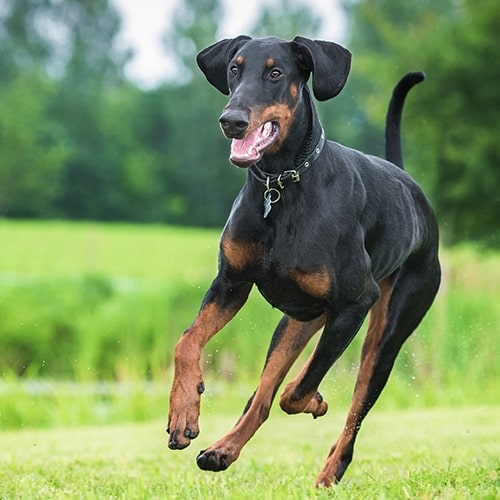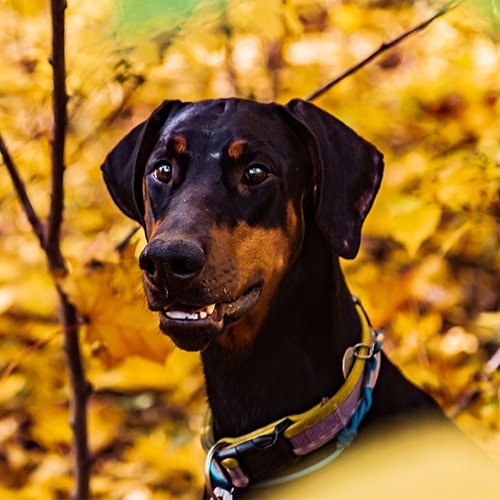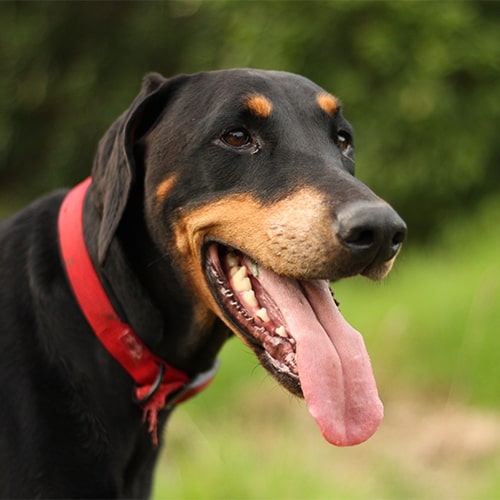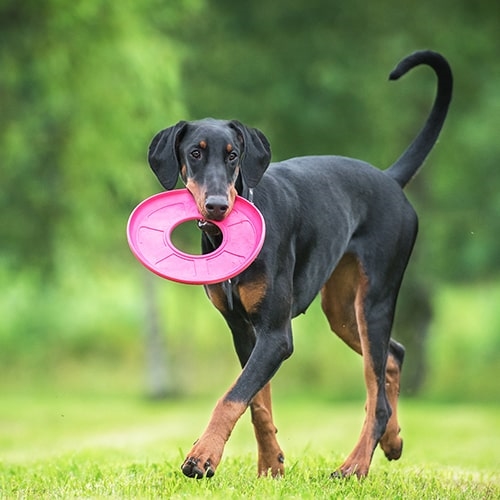| Size | Large |
|---|---|
| Average height | 65-69 cm |
| Average weight | 30kg-40kg |
| Average lifespan | Over 10 years |
| Minimum exercise (per day) | 2 hours |
| Coat length | Short |
| Minimum cost (per month) | £105 |
Dobermanns are a large and powerful breed who love to be involved in everything their owners are doing. They’re loyal and intelligent which makes them popular pets, especially as they can adapt so well to different family lives.
Although they were originally bred to be guard dogs and are often trained by the armed forces and police to be working dogs, with an experienced owner Dobermanns fit well into family life. They suit active families with plenty of space for them to burn off excess energy and play.
Common health problems in Dobermanns
Dobermanns are solid and robust dogs who make great working dogs but also fit in well with family life. Unfortunately, like so many other purebred dogs, they are at risk of certain problems and conditions relating to their breed.
If you are thinking of buying a Dobermann puppy, make sure the parents of your puppy have had the relevant health screening to reduce the chances of your puppy being affected by certain conditions. We’d recommend looking for a Kennel Club Assured Breeder as they meet extra requirements which will benefit your puppy’s health.
Some of the conditions Dobermanns may develop include:
- Hip dysplasia – where hip joint that doesn’t fit together perfectly, which will eventually lead to arthritis. Before breeding, dogs should be screened by x-rays through the BVA/Kennel Club Hip Dysplasia Scheme.
- Wobbler Syndrome – where the bones in the neck are unstable and cause their back legs to be weak.
- Certain cancers.
- Von Willebrand's disease – a bleeding disorder which stops blood from clotting properly and causes wounds to bleed more than they should. There are screening tests available for this.
- Eye problems, such as Persistent Hyperplastic Primary Vitreous (PHPV) – an eye defect which occurs before birth. There is BVA/KC/ISDS testing for this.
- Dilated Cardiomyopathy – a type of heart disease which means their heart is bigger than it should be and doesn’t function properly.
- Gastric Dilatation Volvulus (GDV) – often known as ‘bloat’, this is where the stomach twists. It is an emergency and requires urgent veterinary attention.
- Hypothyroidism – an underactive thyroid, causing problems with weight, skin and energy levels.
If you want to minimise the risk of your dog getting problems due to exaggerated features, you can read our advice on choosing a pedigree dog.
Caring for your Dobermann
Dobermanns tend to flourish in active households where they can be involved in everything going on all the time. With the right training, they can be very calm and well-tempered dogs, although their large size means they probably aren’t the best breed for families with young children or first-time owners.
Dobermanns are very energetic and will need plenty of mental and physical exercise to keep them happy and healthy. They’re keen to learn and need an environment where they won’t get bored – otherwise you may find your furniture and garden pay the price!
Dobermanns and barking
Like all dogs, your Dobermann is likely to bark – how much they vocalise will be down to the individual dog and their training. As they were bred for guarding, you may find that your Dobermann is more vocal if someone new visits your home or if they think you need alerting of something unusual to them. This said, generally speaking Dobermanns are not known to bark excessively and with the right training you should be able to keep barking to a minimum. If you’re having problems with excessive noise or barking, we recommend seeking the advice of an accredited behaviourist.
Training and socialisation
Dobermanns are a very intelligent breed and eager to learn, so they’ll enjoy ongoing, reward-based training to help keep their minds active. If you’re a first-time owner or you’ve not had much training experience, we’d recommend getting help from an accredited trainer and taking your puppy along to training classes. Dobermanns are very intelligent and can be a little wilful during training so you need to be prepared to be consistent with a firm but fair attitude.
Dobermanns form strong bonds with their family and can be protective, so it’s important to socialise your dog with different experiences, people and dogs from a young age. As with any dog, your Dobermann should never be left on their own for more than four hours. Because they get so attached to their owners, you might find that your Dobermann can’t even cope with this and may be destructive around the home to let you know they are unhappy.
We know it can be difficult to be with your dog all the time due to other commitments, so you may want to look for a dog-sitter or have a friend take care of your dog if you need to pop out.
Exercise

Dobermanns are very active dogs and need lots of exercise to keep them happy and healthy. They love nothing more than playing games with their owners and family. Giving your Dobermann plenty of exercise will help to stop them from chewing things they shouldn’t out of boredom.
Dobermanns need a minimum of two hours of exercise every day to help burn off their large amounts of energy. We’d recommend spreading your dog’s exercise across the day rather than trying to do two hours in one go. This should include a couple of walks with time to run off-lead in a secure area. On top of this, they’ll need plenty of playtime, training and free time in the garden. There are lots of ways to exercise your dog and even exercises the two of you can do together!
Grooming
Dobermanns have very low-maintenance coats and their very short fur only needs brushing around once a week to keep in good condition. They do shed, but not nearly as much as other, longer-coated dogs which is another reason they are a popular choice for some owners.
You can expect your Dobermann to shed more than normal in the spring and autumn, so you might want to brush them more frequently. You’ll find that you only really need to give them a bath if they have rolled in something smelly – as they’re quite a large breed, you might want to consider getting a professional to do this.
Dobermanns and children
Dobermanns can be calm and loyal dogs given the right training, but they are still very energetic and so suit active households. While they can make great family pets, due to their large size and strong build we wouldn’t recommend a Dobermann if you have young children.
You should always supervise your Dobermann with children and vulnerable adults as they often don’t know their own strength and may accidentally knock them over. Make sure you can recognise the signs of unhappiness in your Dobermann to help avoid conflicts and keep experiences with other people a positive experience.
Dobermanns and other pets
As long as your Dobermann is given enough time to socialise with other dogs from a young age, they should be fine with other dogs. You need to make sure this is consistent throughout their lives, as Dobermanns have a strong guarding instinct and may be wary of other dogs. If you’re having issues, get advice from a trainer or behaviourist.
Dobermanns are known to have quite a high prey drive and will love any opportunity to chase smaller pets (which may include smaller dog when you’re out on walks, so keep a tight grip on the lead!). Introductions to other pets should be done very carefully and ideally from a young age. Never leave your Dobermann unsupervised with other pets.
Food
Your Dobermann’s diet will vary depending on their age. You’ll need to feed them a complete, balanced dog food to keep them slim and healthy.
Your vet will be able to tell you how much your Dobermann should be eating. You should feed them a good quality, commercially available, complete dog food. We usually recommend splitting their daily allowance into two meals. If you give your dog the occasional treat or use treats for training, remember to take this into account and reduce their daily allowance. Treats shouldn’t make up more than 10% of their daily calorie intake as this can unbalance their diet.
You should try to feed your dog at the same time every day to get them into a routine. Remember to leave at a gap after eating and before exercising.
The cost of owning a Dobermann
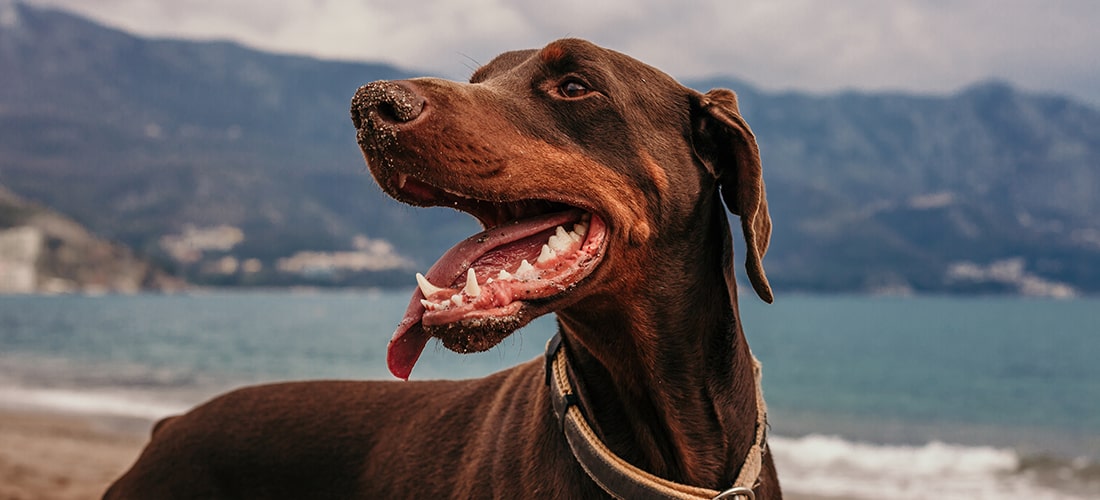
You can expect your Dobermann to cost you a minimum of £105 per month after purchase and set-up costs and over £17,000 across their lifetime.
Costs you’ll need to think about include:
Purchase costs
Adopting an adult Dobermann from a rescue centre may be a more cost-effective option, with the added advantage of giving a home to a pet without one – check if the rehoming centre you’re looking at asks for a donation for rehoming.
If instead you’re buying a Dobermann puppy from a breeder, you’ll need to factor in this cost. Beware unusually cheap puppies as they could come from a puppy farm. If you’d like to buy a pedigree puppy, we recommend looking for a Kennel Club Assured breeder. These breeders must do extra health tests and meet high standards.
Set-up costs
- Puppy vaccines – if you rescue a dog, reputable centres will often vaccinate them for you. Remember that ongoing booster vaccinations will be needed to continue their immunity.
- Neutering – you should usually arrange for your dog to be neutered at around 6-12 months old, though your vet will be able to advise you exactly when is best. Check prices at your local practice as these will depend on your vet and where you live. Some rescue centres will neuter any dogs they rehome, saving you this cost.
- Equipment – including a collar and tags, lead, harness, dog beds, dog bowls, pet-safe toothpaste and toothbrushes, grooming brushes and toys. Keep in mind that all these will need to be replaced with wear or damage or if your dog outgrows or damages them!
Ongoing costs
- Food.
- Preventive healthcare – budget for routine vet visits to help stop your dog getting ill and catch any problems early. They need annual check-ups, vaccinations and regular flea and worming treatments. Check if your vet offers a health care plan as this can help spread the cost throughout the year.
- Vet bills* or pet insurance – if you don’t have pet insurance and your dog needs veterinary treatment for an injury or illness, costs can rapidly mount up. Check what’s covered and what isn’t when comparing policies.
- Accessories – including lots of poo bags, replacing worn toys and grooming accessories, buying doggy toothpaste and any other extras they might need.
Other costs
- Training – basic training is very important and dogs can benefit from formal classes. Some dogs may have, or develop, behavioural problems which might need professional management.
- Boarding – you may also need to budget for boarding or dog sitting costs if you are planning to go away from home on holiday.
- Dog walkers/day-care – you might consider a professional dog walker to keep your dog happy and healthy if you’re unable to get out with your dog enough yourself, or to look after them during the day if you need to be out for more than four hours.
* It’s always better to plan ahead and budget or get pet insurance in case your pet gets injured or unwell. If you are having difficulty with veterinary costs, you can check if you are eligible for treatment at PDSA here.
If you’re considering pet insurance, our PDSA Pet Insurance could be a great option for you and it’s quick and easy to get a quote online.
Fun facts
- The breed originated in Germany – Dobermanns were bred by a tax collector and are believed to be the combination of a lot of different breeds.
- Dobermanns are really intelligent and easy to train in the right hands – they’ve even been known to outsmart inexperienced trainers!
- Despite their reputation as a tough, hard-wearing breed, Dobermanns are actually very sensitive to the cold.
- Dobermanns are brave dogs and were used in WWII. Today, they are often trained as working dogs in the police and armed forces.
Getting a Dobermann
Do plenty of research before you get a Dobermann. These energetic and intelligent dogs need lots of time and attention from their owners, but in return you’ll get a loyal and loving companion who is always looking out for you. In the right hands, Dobermanns can be very obedient dogs, but make sure you are absolutely ready before taking on the responsibility of such a powerful breed.
Rehoming centres
There are plenty of rescue centres across the country where you may find a Dobermann. Breed-specific rescues that specialise in Dobermanns are also out there. You’ll need to ask any rescue centre about the dog’s history to make sure they will be comfortable in your home. Good rescue centres should let you know of any health and behaviour problems.
Breeders
If you buy from a breeder, make sure your puppy will be well socialised and have all necessary screening tests, health checks and vaccinations. It’s really important that Dobermann puppies from a breeder get the right early socialisation so always ask the breeder about how they go about this. We recommend looking for a Kennel Club Assured breeder as they meet higher standards. We’ve put together some advice to help you find a good breeder.

